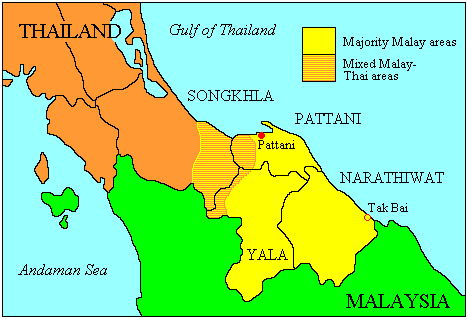
Could the Southern Thailand Insurgency Threaten US Businesses?
The US-China trade war has benefitted some Southeast Asian countries who have been able to fulfill US business’s needs as they pivot away from Chinese manufacturing to avoid tariffs. Vietnam initially emerged as the target for most relocations, but as Vietnam’s labor market tightens, the “manufacturing exodus” has shifted interest to Thailand. As the second-largest economy in Southeast Asia, Thailand has become one of the “leading beneficiaries” from the disruption in trade between the US and China according to Standard Chartered’s Clive McDonnell. However, an insurgency brewing in southern Thailand could have important implications for US companies considering a relocation.
What is the Southern Thailand Insurgency?
The revival of the insurgency occurred in 2004 after a series of deadly encounters with the Thai government. The Southern Thailand insurgency is rooted in Thailand’s 1909 annexation and conquest of the Sultanate of Patani, which makes up the modern-day provinces of Patani, Yala, and Narathiwat. The population of these three rural provinces is 80% Malay Muslims. As a community that is culturally distinct from the rest of the Buddhist majority population, the government’s heavy-handed assimilation policies have resulted in a strong fervor for Malay nationalism.
The insurgency questions the legitimacy of the Thai government’s authority over Malay Muslims and is presented as a nationalist issue, with religious tensions underlying. Despite being contained in the three provinces, the conflict has killed more than 7,000 individuals in the past 16 years–90% being civilians. The most recent outbreak occurred in November 2019 and claimed 15 lives.
The insurgency operates using multiple decentralized groups, making it difficult for the Thai government to combat. The groups include Barisan Revolusi National (BRN), Runda Kumpulan Kecil (RKK), Gerakan Mujahidin Islam Patani (GMIP), Barisan Mersatu Mujahidin Patani (BBMP), and many other smaller, breakaway groups. The rebel groups have come together under the umbrella ‘Mara Patani,’ which is responsible for negotiating on behalf of the factions.
The Larger Anti-Government Rhetoric in Thailand
Earlier this year, police estimated 12,745 people protesting at the capital, making it the largest show of dissent against the government of Prime Minister Prayuth Chan-ocha since the 2014 military coup. The military administration has committed multiple human rights violations during its reign, including censorship and forced disappearances. This blatant disregard for human rights has heightened the anti-government sentiment, especially among younger Thai citizens. The contested March 2019 election that continued the military’s power has only fueled the pro-democracy movement in Thailand. If the tension continues to grow, the Southern Thailand insurgency could use the resulting instability to increase its violence outside of the three provinces.
US Increasing Investment Interest in Thailand
Before the US-China trade war, investing in Thailand was a decision that many companies made in order to diversify their manufacturing. In May 2017, Harley Davidson had moved its production to Thailand. On August 20, 2019, Home Depot Executive Vice President Ted Decker told investors:
“On the margin, I’m not aware of a single supplier who is not moving some form of manufacturing outside of China. So, we have suppliers moving production to Taiwan, to Vietnam, to Thailand, Indonesia, and even back into the United States.”
Deputy Secretary-General of the Thailand Board of Investment, Khun Chokedee, confirmed this sentiment stating:
“American companies in China have come to us saying they are thinking of relocating and Thailand is a destination for them in Asia.”
Although the US-China Phase 1 trade deal addresses some tariffs, it is not comprehensive enough to tempt companies to stay in China, especially with the severity of the Coronavirus furthering companies’ need to conduct business elsewhere.
Caution Moving Forward
Despite posing a smaller threat to areas outside of the southern tip of Thailand, the insurgency has shown that it is willing to stage larger attacks outside of their area of control. In August 2019, 6 bombs linked to the insurgency went off in Bangkok during a ASEAN Summit with top diplomats from the US, China, and other world powers.
Although it remains to be seen whether the insurgency will hinder the increasing number of business developments in Thailand, US companies should be paying close attention to the next round of peace talks between the BRN and the Thai government in March or risk getting caught in the crossfire.





